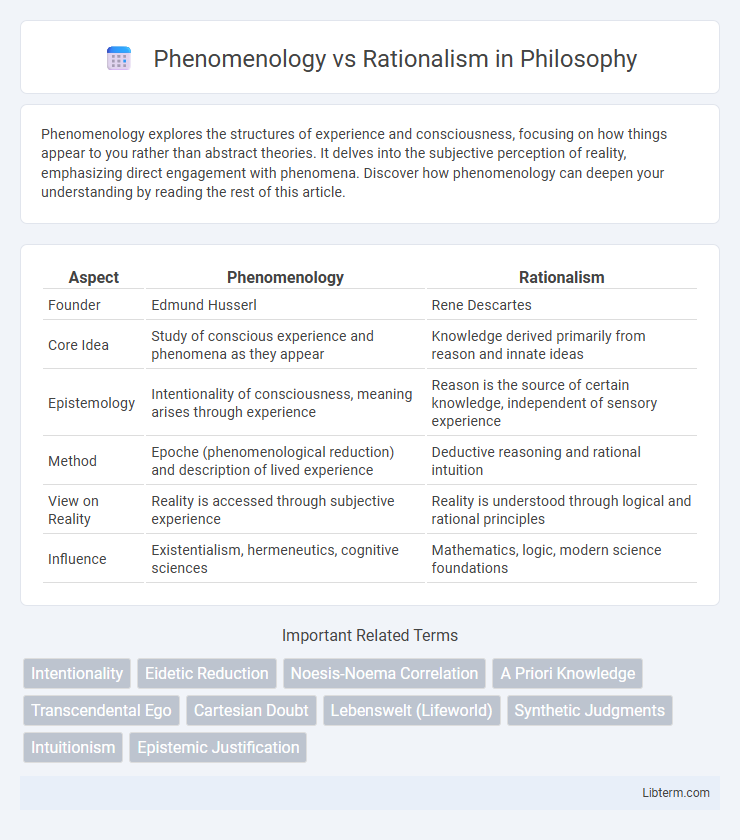Phenomenology explores the structures of experience and consciousness, focusing on how things appear to you rather than abstract theories. It delves into the subjective perception of reality, emphasizing direct engagement with phenomena. Discover how phenomenology can deepen your understanding by reading the rest of this article.
Table of Comparison
| Aspect | Phenomenology | Rationalism |
|---|---|---|
| Founder | Edmund Husserl | Rene Descartes |
| Core Idea | Study of conscious experience and phenomena as they appear | Knowledge derived primarily from reason and innate ideas |
| Epistemology | Intentionality of consciousness, meaning arises through experience | Reason is the source of certain knowledge, independent of sensory experience |
| Method | Epoche (phenomenological reduction) and description of lived experience | Deductive reasoning and rational intuition |
| View on Reality | Reality is accessed through subjective experience | Reality is understood through logical and rational principles |
| Influence | Existentialism, hermeneutics, cognitive sciences | Mathematics, logic, modern science foundations |
Introduction to Phenomenology and Rationalism
Phenomenology centers on the direct exploration of conscious experience, emphasizing how phenomena appear to the mind without preconceived notions, as developed by Edmund Husserl. Rationalism prioritizes reason and innate ideas as the primary sources of knowledge, asserting that reality can be understood through deductive reasoning, with key philosophers like Descartes and Spinoza. Both approaches seek foundational knowledge but differ sharply in method: phenomenology relies on subjective experience, while rationalism depends on logical deduction.
Historical Origins and Key Philosophers
Phenomenology originated in the early 20th century with Edmund Husserl, emphasizing the direct investigation of conscious experience to uncover the structures of phenomena. Rationalism, dating back to the 17th century, is rooted in the works of Rene Descartes, Baruch Spinoza, and Gottfried Wilhelm Leibniz, asserting that reason and innate knowledge are the primary sources of understanding. Both philosophical traditions significantly shaped epistemology, with phenomenology focusing on experience and intentionality, while rationalism prioritizes deductive reasoning and a priori knowledge.
Core Principles of Phenomenology
Phenomenology centers on the direct investigation and description of phenomena as consciously experienced, emphasizing intentionality and the subjective structure of experience. It prioritizes the lived experience and the ways objects appear in consciousness, suspending assumptions about external reality through the method of epoche or phenomenological reduction. Core principles include the analysis of perception, temporality, embodiment, and the essential structures of consciousness to reveal the meaning inherent in experience.
Core Principles of Rationalism
Rationalism asserts that knowledge primarily derives from reason and innate ideas rather than sensory experience, emphasizing deductive logic and intellectual intuition as core methods. It posits that certain truths, such as mathematical and conceptual principles, exist independently of empirical evidence and can be accessed through rational thought alone. This contrasts with phenomenology, which centers on lived experience and consciousness to understand phenomena.
Methods of Acquiring Knowledge
Phenomenology acquires knowledge through direct subjective experience and intentional consciousness, emphasizing the exploration of phenomena as they appear to the mind. Rationalism relies on reason and logical deduction, asserting that knowledge is innate and can be attained independently of sensory experience. These methods contrast in that phenomenology prioritizes experiential insights, while rationalism depends on intellectual abstraction and a priori principles.
Role of Subjectivity and Objectivity
Phenomenology emphasizes the centrality of subjectivity, exploring how individual consciousness and lived experience shape understanding and meaning. Rationalism prioritizes objectivity, asserting that reason and logical deduction reveal universal truths independent of personal biases. The contrast highlights phenomenology's focus on first-person perspectives versus rationalism's trust in objective, a priori knowledge.
Key Differences Between Phenomenology and Rationalism
Phenomenology centers on direct experience and the structures of consciousness, emphasizing how phenomena appear to the mind through intentionality. Rationalism prioritizes reason and innate ideas as the primary source of knowledge, asserting that truths can be discovered independently of sensory experience. Key differences include phenomenology's focus on subjective experience versus rationalism's reliance on logical deduction and a priori knowledge.
Influences on Contemporary Thought
Phenomenology, founded by Edmund Husserl, profoundly influenced contemporary existentialism, hermeneutics, and cognitive science by emphasizing direct experience and the structures of consciousness. Rationalism, rooted in Descartes and Spinoza, shaped modern analytic philosophy and scientific methodology through its focus on reason, innate ideas, and deductive logic. The interplay between these traditions continues to inform debates on epistemology, consciousness, and the nature of knowledge in 21st-century philosophy.
Criticisms and Limitations
Phenomenology faces criticism for its reliance on subjective experience, making its findings difficult to verify or generalize scientifically. Rationalism is often challenged for overemphasizing reason while neglecting empirical evidence, limiting its applicability in understanding sensory or emotional aspects of human experience. Both philosophies grapple with balancing abstract theorization and practical validation, leading to ongoing debates about their epistemological scope.
Conclusion: Bridging the Divide
Phenomenology emphasizes direct experiential knowledge of consciousness, while Rationalism prioritizes reason and innate ideas as sources of knowledge. Bridging the divide involves recognizing how phenomenological insights can inform rationalist frameworks, enriching understanding through lived experience and structured reasoning. Integrating these approaches advances a more comprehensive epistemology that embraces both subjective awareness and objective logic.
Phenomenology Infographic

 libterm.com
libterm.com